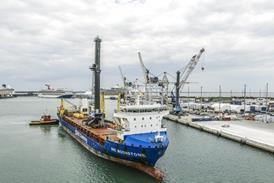The European association of abnormal road transport and mobile cranes (ESTA) said that its plan to develop a transport operators’ licence for modular hydraulically suspended trailers (MHST), including SPMTs, has been given a further boost.
ESTA said that following the latest in-person meeting of its European Transport Operators Licence (ETOL) working group in Amsterdam during January, learning outcomes, the generic training design and the requirements demanded of training institutes were all set out for the transport operators’ licence.
Group members were also asked to comment on draft transport operators’ guidelines – an overview of the operators’ tasks, requirements and responsibilities and one of the suite of documents that will make up the final version of the best practice guide. In addition, the group backed the three-tier training structure supported by the ECTOL Expert Committee during ESTA’s series of Autumn meetings in Istanbul.
The ECTOL Expert Committee is the recently created body that oversees the operation of both ESTA’s European crane licence scheme (ECOL), as well as the new transport licence project (ETOL).
Under the plans, MHST operator training will be split into three separate levels:
Level 1: an e-learning module – a no examination entry level to guarantee minimum knowledge and safety; Level 2: in-class and practical learning, concluding with a theory test by a training provider leading to a trailer users’ certificate, and equivalent to the training offered today by many manufacturers; Level 3: in-class and practical learning, concluding with a combined theory and practical examination by an authorised training provider, leading to a full ETOL operator certificate.
Between Level 2 and Level 3, a 120 working day apprentice period is foreseen, with specific actions to be registered in an ETOL task book.
ESTA director Ton Klijn said: “This is a major and hugely important project that we hope will significantly improve safety and standards on [a] wide range of projects. With the use of SPMTs becoming ever more widespread, it is clearly essential that an internationally recognised training standard for operators is developed and accepted as soon as possible.”
A next step is to develop a glossary of terms to support the requirement that operators are able to master a minimum amount of English.
















